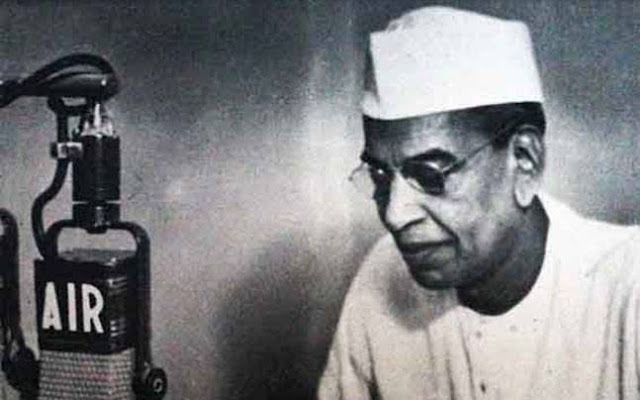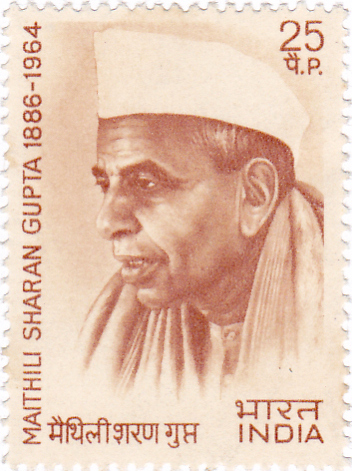Popular Hindi ghazal writer Dushyant Kumar Tyagi was born on September 1, 1933 in Bijnor district of Uttar Pradesh. He started his poetry writing with the name of Dushyant Kumar Pardeshi. From early on in class ten, he showed his flair of poetry which further got a new dimension during his studies at Allahabad University. He was also active with organizations like 'Parmal' and 'Naye Patte' and he got the company of active litterateurs in Allahabad. This friendship and camaraderie gave rise to many fellow poets and authors like Kamaleshwar and Markandeya.
Though Dushyant was prolific in poetry, drama, one-act plays and novels, he gained timeless popularity from ghazals. His expressions questioning the ironies of the times, state of poor in the society, class division with lines like 'creating a ruckus is not my intention' echo from the Parliament to the streets and the common man is able to find his voice in him. His ghazals were a song of cry and weapon of expression.
'Surya ka Swagat', 'Awaoz ke Ghare', 'Jalte huye van ka vasant' are his poetry collections, while in the form of 'Chhote-chhote saval', 'Aangan mein ek vriksha' and 'Duhri Zindagi' he has worked in the novel genre. Have contributed. 'And Messiah Mar Gaya' is his famous play and 'Mann Ke Kon' is a one-act play written by him. He has also composed a poetry-drama titled 'Ek Kanth Vishpayee'. The basis of his lasting fame is his only ghazal collection 'Saye Mein Dhoop', dozens of ghazals of which play a daily part in the dialogue and address of Hindi-country.
He died on 30 December 1975 at the age of just 42. A postage stamp has been issued in his honour by the Government of India. An effort has been made to preserve his heritage in the 'Dushyant Kumar Memorial Manuscript Museum'.
Context of the poem
The ghazal Kahan To Thay Tha is an expression of human suffering. The poet has described the strains of human living in both a pessimistic as well as in a positive manner. The poet states that even after Indian independence, the majority public is still under poverty and lacks development. He laments that the basic needs of food, clothing and refuge are not being provided adequately to the commonplace man.
Full text of the poem in Hindi
कहाँ तो तय था चराग़ाँ हर एक घर के लिए
कहाँ चराग़ मयस्सर नहीं शहर के लिए
यहाँ दरख़्तों के साए में धूप लगती है
चलें यहाँ से चलें और उम्र भर के लिए
न हो क़मीज़ तो पाँव से पेट ढक लेंगे
ये लोग कितने मुनासिब हैं इस सफ़र के लिए
ख़ुदा नहीं न सही आदमी का ख़्वाब सही
कोई हसीन नज़ारा तो है नज़र के लिए
वो मुतमइन हैं कि पत्थर पिघल नहीं सकता
मैं बे-क़रार हूँ आवाज़ में असर के लिए
तिरा निज़ाम है सिल दे ज़बान-ए-शायर को
ये एहतियात ज़रूरी है इस बहर के लिए
जिएँ तो अपने बग़ैचा में गुल-मुहर के तले
मरें तो ग़ैर की गलियों में गुल-मुहर के लिए
Literal line to line meaning
There was fixed pasture land for every house.
Where there is no light for the city
Here the sun shines in the shade of the trees
Let's go from here and forever
if you don't have a shirt, you will cover your stomach with your feet.
How suitable are these people for this journey?
God is not right, man's dream is right
There is a beautiful sight to behold.
They are sure that the stone cannot melt
I am desperate for impact in voice
If you live in your garden under the gulmuhar
If I die, I will die for Gulmuhar in other streets.
Further explanation of the poem
Dushyant ji satirises politics and says that politics shows people big dreams. He says that the leaders had announced that they will provide some lamps which is also symbolic of basic necessities and facilities in every house of the country. But the real situation is such that even in the big cities, there are no lamps i.e. facilities available. The leaders' announcement is on paper that it will bring prosperity in the lives of the people living in the houses, but their assurance remained in vain.
Imagery used in the poem
चिराग़
Lamps which are also symbolic of light removing darkness (poverty) and also of basic necessities and facilities.

दरख़्त
Tree. The poet says that a tree which is supposed to give shade has now become a provider or cause of corruption. He refers to politicians who promise something but perform something else , contrary to ideals and needs of the larger society. These institutions and establishments have started exploiting the common man. Corruption is spread everywhere.
The poet wants to spend his life living away from all these pains and sufferings and voices what every common man in these situations will feel.
कमीज़
Shirt or clothing - another basic necessity for humans. The poet says that this is also something that a leader should provide. But with the corrupt ways of the leaders and politicians, they are unable to do so. So the people have also lost the will to live in the place and want to go away and they have lost the will to fight. So they come up with their own solution - If they are without clothes, they will happily cover their stomachs by folding their legs on top. The people will have to come up with ways to survive.
सफ़र
Journey - in the context of the poem it means that the life journey of the people and their existence will not be long or will not be sustainable if this kind of corruption exists around them.
हसीन नज़ारा
Beautiful scene. At this point of the poem, the poet expresses further loss of hope. He says that there is no God in the whole world. But it doesn't matter for him, as he believes that God is just a figment of man’s imagination. It is likely that he expresses his anger and disappointment that God who could have helped the poor from the corrupt ways of the leaders and from the poverty, hunger and homelessness, is just a static being without action. He states that God is just a common man's dream. He states that if some people feel happy to have that beautiful scene in their minds for temporary happiness and consolation, so be it.
पत्थर
Stone - The poet says that the politicians and corrupt leaders are secure and overconfident in the feeling that stone cannot melt, which is to say that the state of life will be the same - people won't protest, people are tired, there is no God to punish these leaders nor to save the helpless poor.
आवाज़ में असर
Impact in voice. But the poet also has hope and desire. The poet is waiting for an impact and a spark of revolution in the voices of common people. He hopes that their voices will be loud and common people should organise and protest.

सिल दे ज़ुबान शायर की
Stitch up the mouth/voice of the poet. Powerful and corrupt leaders will always have an arrangement and system to use their money and power to try to trample upon the protests of people - whether poets or the public.
The poet shows an ironic similarity in the way minds think - minds of poets in comparison to minds of politicians - he says that just as caution is necessary for a ghazal verse, in the same way rulers also need to suppress opposition to maintain their power.
बग़ीचे में गुलमोहर
Our own garden of gulmohar
गलियों में गुलमोहर
Streets of gulmohar
The poet ends by saying that as long as we live in our garden, we live under the Gulmohar (here symbolising good values and rewards of hard work and values ) and when the season is ended , we die for the Gulmohar in the streets of others. In other words, as long as we live, we live for others as well, helping them and helping those who less privileged than us.







